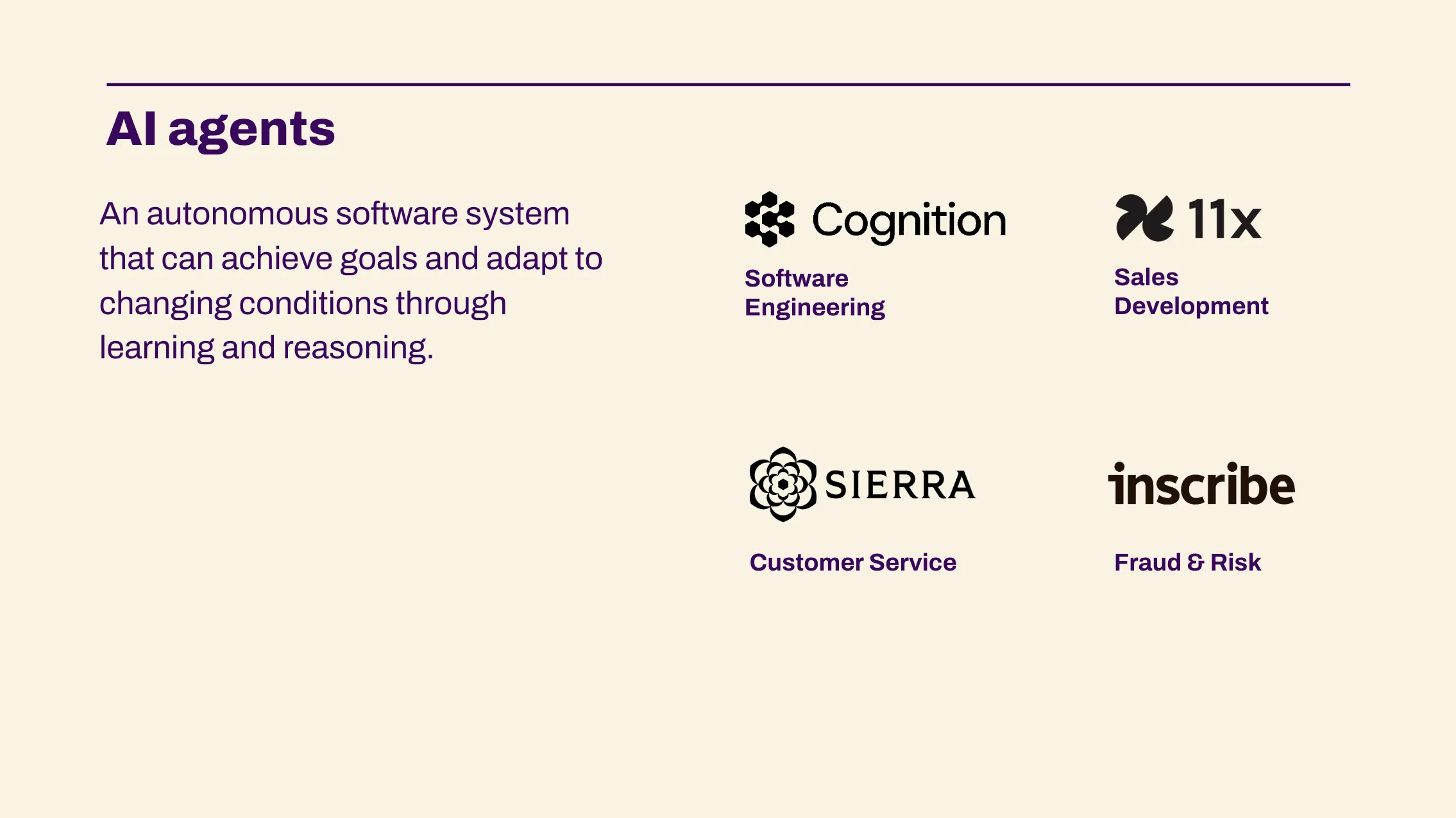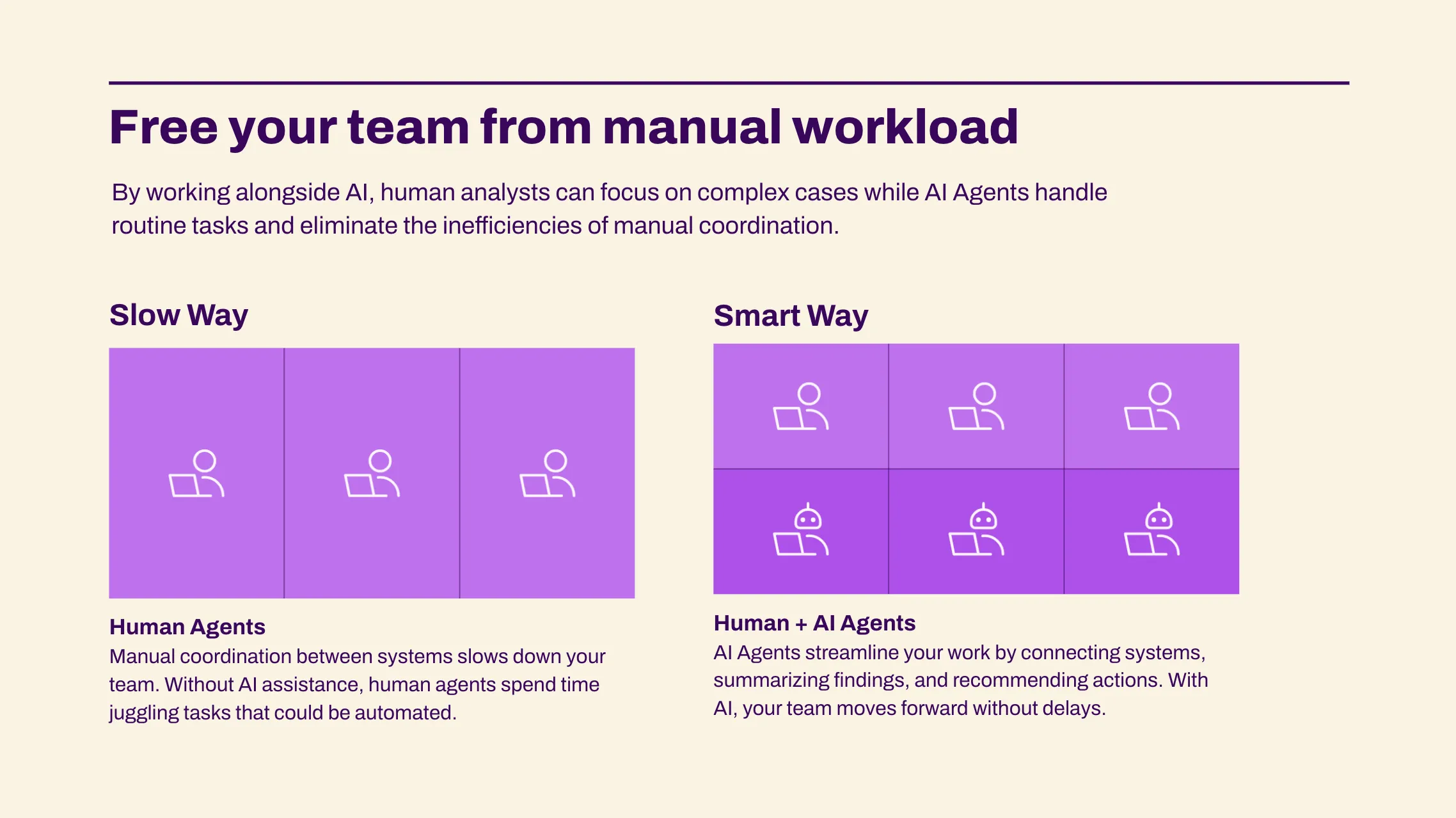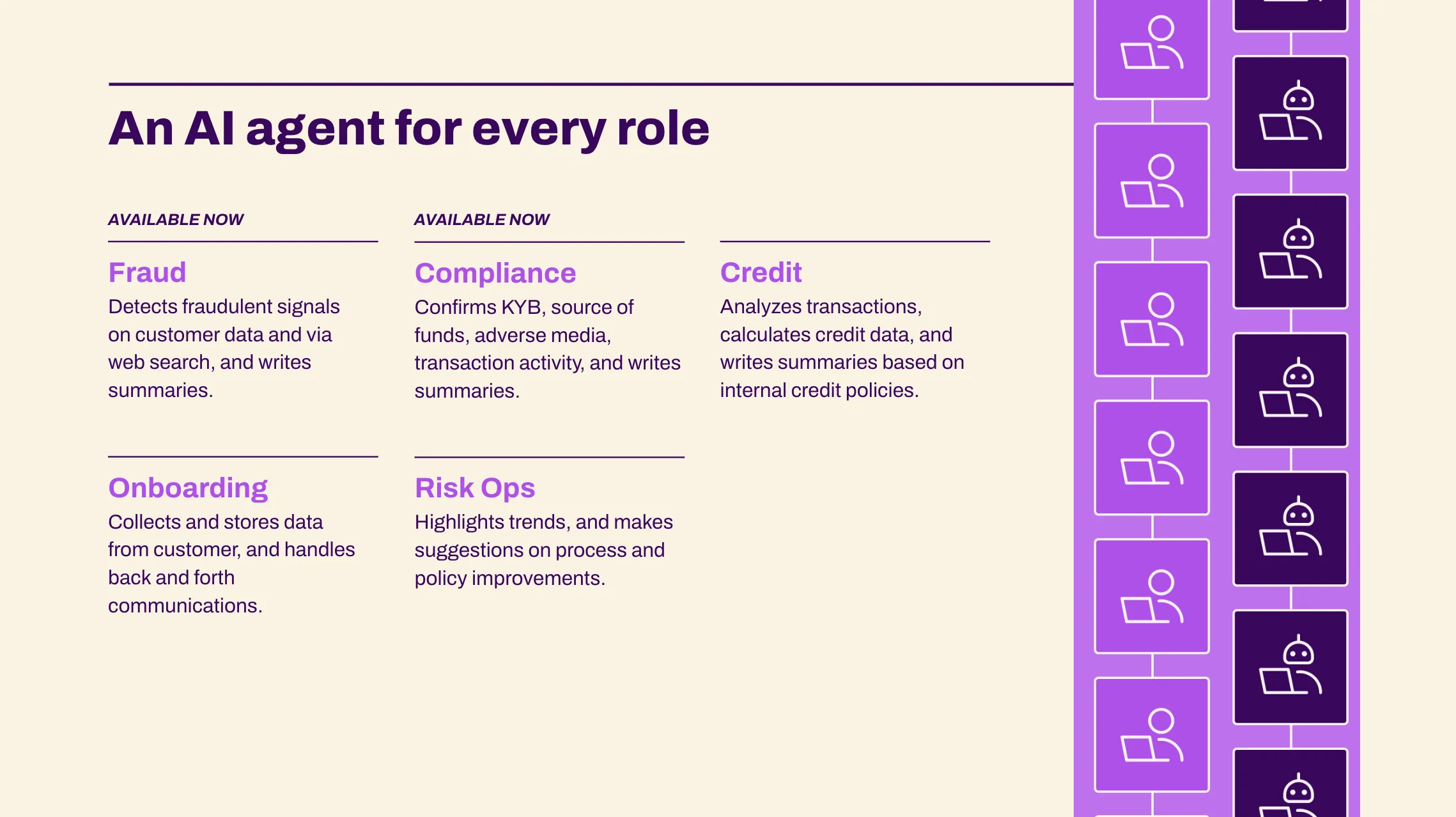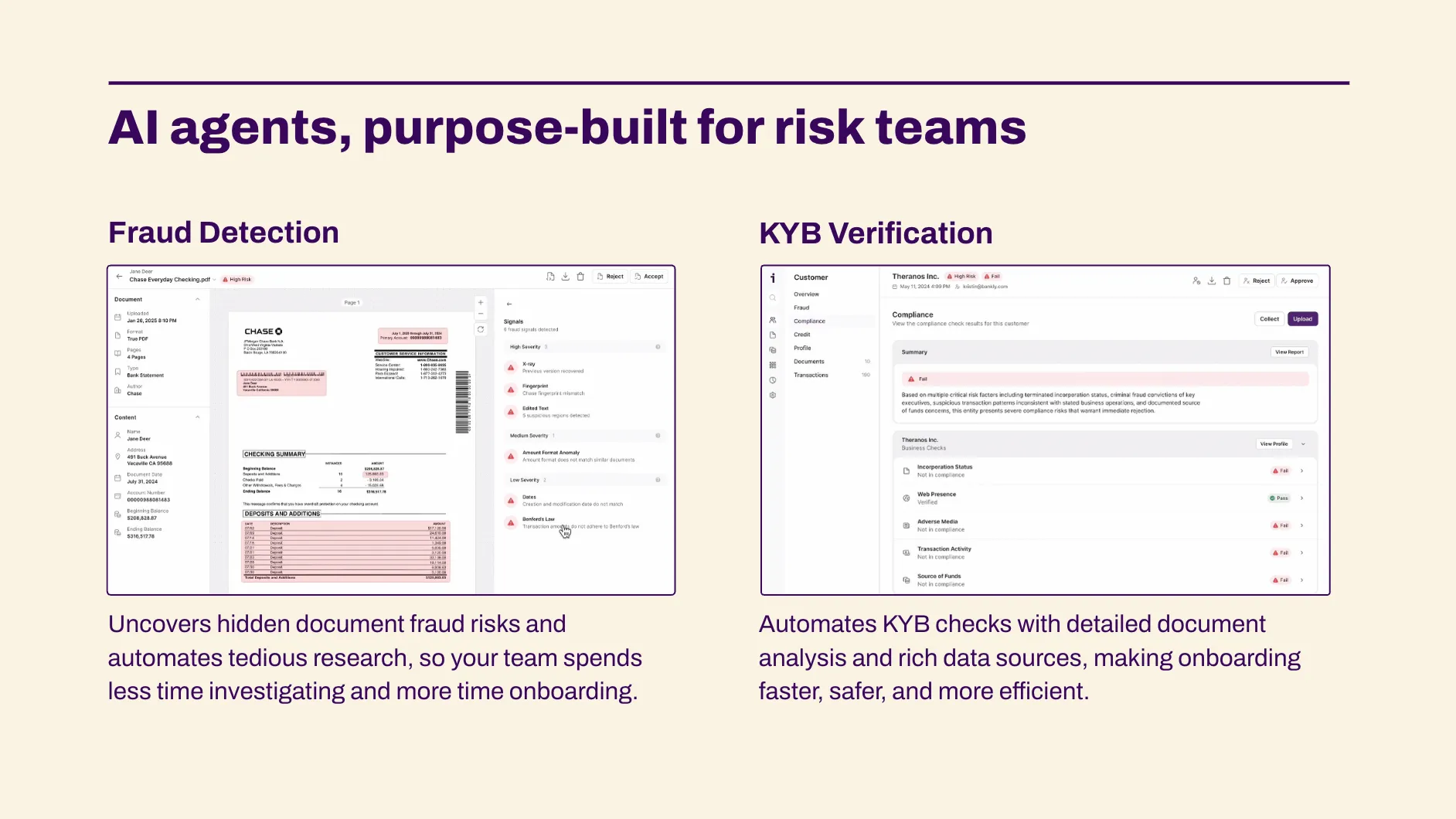Fintech 2030: Envisioning an AI workforce for risk teams
Table of Contents
[ show ]- Loading table of contents...
Ronan Burke
At Inscribe, our mission has always been clear: to enable instant trust in financial services.
As we move into 2025, our vision for achieving this mission has never been more precise, driven by two significant trends: the rise of agentic systems and the transformation of financial services through AI.
What does “instant trust” mean?
When we talk about instant trust, we're envisioning a financial services landscape where interactions are seamless and immediate. Whether you're opening an account, applying for a loan, or modifying a financial service product, the experience should be frictionless, fast, and fair.
Traditional financial services often suffer from slow, manual, human-oriented processes. By automating and augmenting these workflows through AI agents, we can fundamentally change how these businesses operate – improving both customer experience and reducing costs that are ultimately passed on to customers.
By working alongside AI, human analysts can focus on complex cases while AI Agents handle routine tasks and eliminate the inefficiencies of manual coordination. This approach allows teams to move forward without delays, transforming manual workloads into streamlined processes.
We see an AI workforce risk team at the core of this transformation. These AI-powered teams will perform tasks that traditionally took humans hours, or even days, to complete.
The rise of agentic systems
When we talk about AI agents, we're not just discussing incremental improvements to existing systems. We're witnessing what may be the biggest technology wave of our lifetimes – with Large Language Models (LLMs) emerging as the closest approximation to human intelligence we've ever achieved.
Here's why:
- LLMs are uniquely suited to handle the core work of risk teams – retrieving data, synthesizing information across software systems, and identifying anomalies and patterns
- As performance improves, these systems can solve problems that were previously impossible, enabling entirely new types of products
- Decreasing costs make it feasible to use multiple LLM prompts for a single unit of work, dramatically improving accuracy and capability
- These advances are creating the foundation for truly autonomous software systems that can achieve goals and adapt to changing environments
The landscape of AI is rapidly evolving. What began as early discussions about agents in late 2023 has now matured into a concrete reality. Throughout 2024, we saw major players like Google, Microsoft, and Apple release consumer-facing agent features. Now, in 2025, we're seeing enterprises and B2B software providers like Inscribe delivering truly agentic systems to customers.

An AI agent is an autonomous software system that can achieve goals and adapt to changing environments through learning and reasoning. These systems are characterized by five key components:
- Inputs: Diverse data sources including documents, banking data, and public information
- Tools: Specialized capabilities for analysis and processing
- Planning: Strategic frameworks for decision-making
- Collaboration: Natural language communication and inter-agent cooperation
- Reflection: Continuous improvement through feedback and self-evaluation
Why are AI Agents so well-suited for financial services?
One of the key reasons AI agents are perfect for financial services is their ability to handle both standardized processes and ambiguous edge cases. Risk teams often deal with documents, financial data, and other inputs that can be tricky for traditional software to process. AI agents, particularly those powered by large language models (LLMs), can understand and analyze this data with far more nuance than previous systems, making them a powerful tool in detecting fraud and assessing risk.
Moreover, the decisions these AI agents help make are vital for the financial services sector. Correctly identifying fraud, managing compliance, and assessing credit are fundamental to ensuring that financial services remain fair and accessible. Every decision has a significant impact on a company’s bottom line and its customers' experiences.
The confluence of several factors makes this the perfect time for AI agents in financial services:
- Technology maturity: LLMs have reached a level of sophistication that makes human-like reasoning and adaptation possible
- Industry readiness: Financial services companies are actively seeking solutions to improve efficiency and reduce costs
- Market demands: Increasing competition and regulatory pressure require more robust risk management solutions
- Cost economics: Decreasing costs of AI operations make comprehensive agent solutions financially viable
How does an AI Workforce for risk teams help us get there?
Our vision of creating an AI workforce for risk teams is clearer now than ever.

For years, companies have relied on solutions that required constant human interpretation and intervention. But with advancements in AI, software can now deliver human-level outputs, dramatically reducing the need for manual oversight. By working alongside AI, human analysts can focus on complex cases while AI agents handle routine tasks and eliminate the inefficiencies of manual coordination.
In financial services, where accuracy, speed, and fairness are critical, this collaboration between human agents and AI is a game-changer. AI agents connect systems, summarize findings, and recommend actions, allowing teams to move forward without delays. This shift is revolutionizing how companies make decisions on fraud, compliance, and credit.
Already, some of our customers are seeing the impact. A major personal lender is now automatically approving 11% of its applications using our technology. In other cases, customers have reduced onboarding times from 26 days to just 10. Logix Federal Credit Union also achieved faster loan processing times, reduced operational costs, and successfully prevented fraudulent applications totaling $3 million, all while improving member satisfaction. And this is just the beginning — AI is making the smart way of working possible.
AI agents for fraud, compliance, and every risk role
Today, we’re focused on enhancing our AI Agents, collaborating closely with customers. These AI Agents are designed to handle most of the tasks that a human fraud or compliance analyst would perform, but with greater speed and efficiency. They use detailed document analysis and rich data sources like Secretary of State records to perform key checks on incorporation status, web presence, adverse media, transaction activity, funding sources, and beneficial owners. By catching risks that humans may miss, they make onboarding faster, safer, and more efficient than your competition.
What’s especially exciting is the convergence of these functions. Since fraud, compliance, and credit analysis often require overlapping data and similar skill sets, we believe the future of risk management lies in creating AI Agents that can perform across multiple roles. The objectives may differ — fraud detection versus compliance —but the underlying technology remains unified.

Financial services in 2030
Looking ahead, AI agents will become an integral part of every risk team in financial services. These AI-powered teams will not only streamline operations and reduce manual input, but also enhance fraud detection by leveraging advanced technologies like LLMs. Our AI agents can already identify complex fraud patterns — like repeated account numbers across millions of documents or pixel-level misalignments — that human analysts might miss. By collaborating with fraud teams, these agents will handle routine tasks, allowing analysts to focus on more complex cases and making fraud detection faster, more accurate, and scalable.
In just a few years, we envision our customers using AI agents that do hours of work with minimal effort. These agents won’t just process data — they’ll interpret results, identify patterns, and even make recommendations, all while continuously improving through real-time data analysis and self-improving systems. AI agents will flag emerging risks, adjust fraud detection rules, and keep teams ahead of evolving threats, thanks to a vast, expanding fraud detection network.
The future of financial services is here, and we’re excited to lead the way, building smarter, more efficient systems for our customers as they continue to navigate this transformation.
Stay tuned for what’s next
We're already witnessing the power of AI agents in action, but this is just the beginning. Our teams are working closely with our incredible customers to continue refining these tools and expand their capabilities.
Here’s how our AI Agents are already making a difference:
- Natural language summaries and risk scores: Our agents provide clear, concise summaries and a risk scoring system powered by logistic regression, helping fraud teams quickly assess flagged documents.
- Web-based research and corroboration: In just seconds, our agents cross-check documents against online sources, reducing review time from 10 minutes to just 72 seconds.
- Contextual document analysis: By analyzing documents in relation to historical data and metadata, our agents identify anomalies and hidden risks that might otherwise go unnoticed.
- High-precision text interpretation: Using large language models (LLMs), our agents accurately extract and interpret text, detecting fraudulent alterations or inconsistencies with precision.

The world of financial services is on the cusp of a major transformation, and we’re excited to be driving that change. Stay tuned as we expand our AI workforce and continue helping create a more efficient, fair, and trustworthy financial system.
If you’re a risk leader or financial services operator interested in learning more, we’d love to have a conversation. Simply reach out to schedule a meeting with our team.
About the author
Ronan Burke is the co-founder and CEO of Inscribe. He founded Inscribe with his twin after they experienced the challenges of manual review operations and over-burdened risk teams at national banks and fast-growing fintechs. So they set out to alleviate those challenges by deploying safe, scalable, and reliable AI. A 2020 Forbes “30 Under 30 Europe” honoree, Ronan is also a Forbes Technology Council Member and has been featured in Fast Company, VentureBeat, TechCrunch, and The Irish Times. He graduated from the University College Dublin with a Bachelor's degree in Electronic Engineering and later completed the Y Combinator startup accelerator program.
What will our AI Agents find in your documents?
Start your free trial to catch more fraud, faster.






